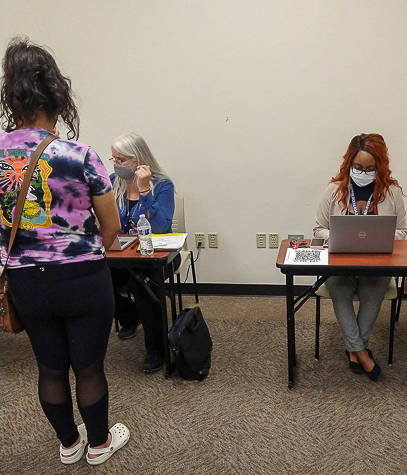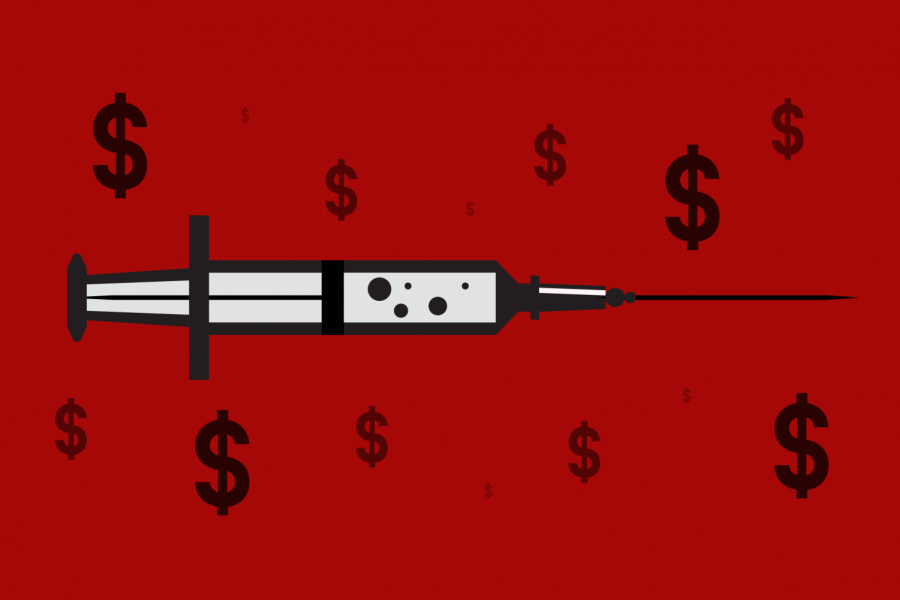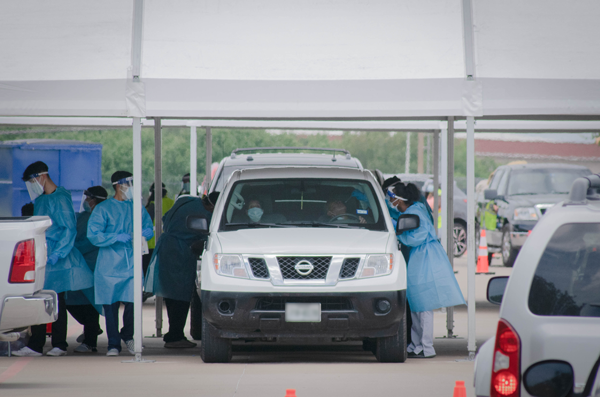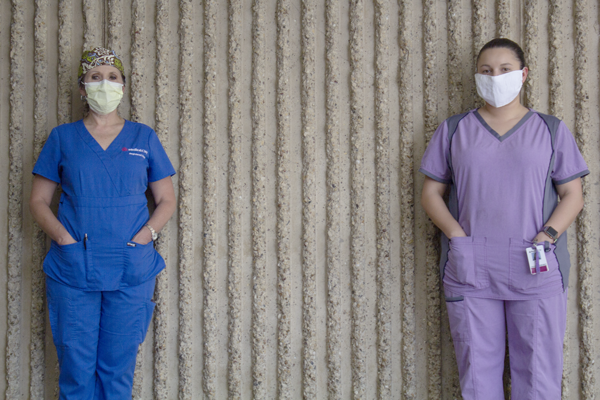
By HARRIET RAMOS
@HarrietRamosETC
Mary Craft stood at the Medical City Dallas entrance on a recent Wednesday afternoon with a no-contact forehead thermometer in her gloved hand, checking the temperature of every person who came in the building. Craft is an operating room nurse, but that day she was the first line of defense in identifying potential COVID-19 cases before they could enter the hospital.
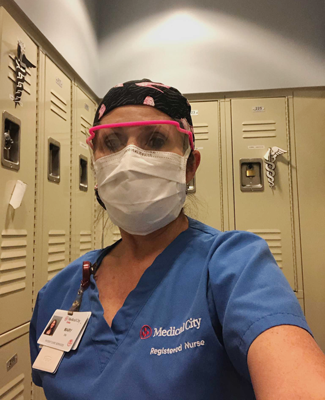
A man approached the entrance, wearing latex gloves and covering his face with a T-shirt. He told Craft he had been exposed to the coronavirus and had been coughing and experiencing shortness of breath. He didn’t have a fever, but Craft sent him over to the emergency room anyway.
Craft never heard if the man tested positive for COVID-19, but she knows it’s not just patients with a cough she has to worry about.
“Most people are asymptomatic,” Craft said. “I could have come in contact with a COVID patient and they just didn’t have any symptoms.”
On March 25, the day that Craft was checking temperatures, Dallas County reported 78 new coronavirus cases, bringing the total to 247. It was the largest single-day increase up to that point. Two people died, raising the death toll to 7.
Being exposed to the coronavirus is just one of the uncertainties Craft faces at work. At a time when many medical personnel are stretched to the breaking point, her hours have been cut. On March 22, Gov. Greg Abbott ordered all surgeries that are not medically necessary be postponed in preparation for an expected surge in COVID-19 cases.
Craft, an Eastfield student who is taking prerequisites for a Bachelor of Science in nursing, has worked in the operating room at Medical City for 11 years. She used to assist with as many as eight surgeries a day. Now it’s four on a good day, but usually fewer.
“You go in and either you’re called off … or you go in and do one or two surgeries and there’s just nothing more to do,” she said.
Some of her co-workers help in other areas, such as the intensive care unit. That’s not an option for Craft. Her husband has a lung disease that puts him at high risk for serious illness if he should contract the coronavirus. She cannot risk exposing herself more than is necessary and potentially infecting her husband.
Craft said there is growing anxiety in her colleagues as the number of COVID-19 patients in the area continues to mount.
“I can see it in their faces,” she said.
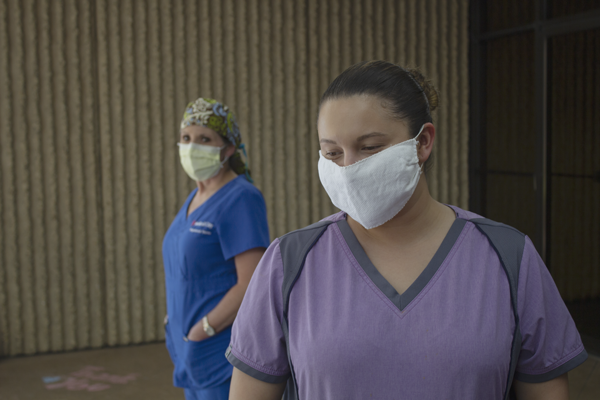
As of April 14, Dallas County Health and Human Services reported a total of 1,877 confirmed COVID-19 cases in Dallas County. Out of that number, 42 people have died.
Craft said the Dallas area has not hit its peak in cases yet, and probably won’t for another two or three weeks.
In the meantime, Craft said she and her co-workers have changed the way they deal with patients in the operating room.
“Basically, we have to treat every patient as if they were positive,” she said. “[We] take all precautions necessary.”
Craft wears a surgical mask, goggles and gloves as part of her personal protective equipment. Only the surgeons and anesthesiologists, who are most at risk for infection because of their close contact with patients, are given N95 masks that provide a greater level of protection.
“We don’t have enough,” Craft said. “They’re very particular in how they hand those out right now.”
Hospitals all over the U.S. are experiencing a shortage of N95 masks and other protective equipment as confirmed COVID-19 cases are approaching 600,000 nationwide. In a March 24 press conference, Abbott said the state is working to solve that problem.
The recently established supply chain strike force is collaborating with the federal government and private sector to acquire more personal protective equipment for Texas health care workers.
[READ MORE: Jenkins calls for more testing, PPE for Dallas]
“Yesterday, that strike force placed an order for more than $80 million worth of supplies,” Abbott said. “Altogether, next week, Texas should be getting more than a million masks per week.”
Craft’s daughter Lauren Vijil is a clinical assistant and receptionist at a vascular surgeon’s office, also located at Medical City Dallas. She is facing challenges similar to her mother’s.
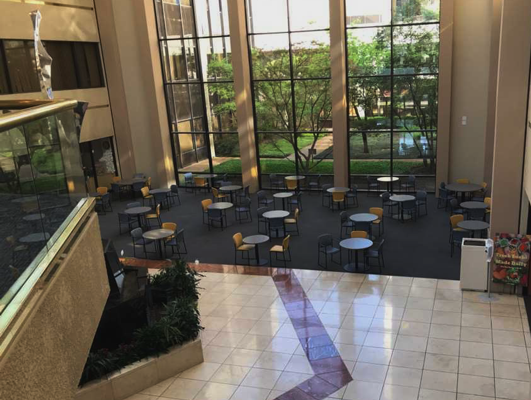
She said many of the patients are afraid to leave their houses to come in for appointments. Others have had to postpone surgeries that are not considered medically necessary.
Vijil, who is studying for an Associate of Science degree at Eastfield, said the time drags by because the patient load is so light.
“It’s just kind of like the twilight zone,” she said.
The staff has had to change the way they relate to patients who do come in.
When Vijil takes a patient back to the examination room, she no longer checks their blood pressure. She sits six feet away from them as she asks them questions and records their medical history.
“It’s really sad,” she said. “It’s hard to care for somebody when you can’t give them that personal touch.”
Vijil said in spite of the precautions there is still a chance she or one of her co-workers could be exposed to the coronavirus. They just try to take each day as it comes and remind each other that tomorrow is another day.
Craft has a similar way of dealing with the uncertainty she faces at the hospital.
“Just take a deep breath and pray for the best,” Craft said. “Make sure I’ve practiced my hand hygiene and wear lots of protective gear. That’s all I can do for right now.”
https://eastfieldnews.com/2020/04/13/18315/


